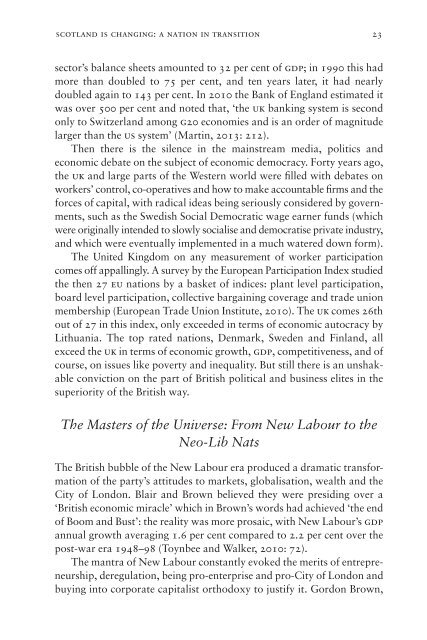Caledonian Dreaming by Gerry Hassan sampler
Caledonian Dreaming: The Quest for a Different Scotland offers a penetrating and original way forward for Scotland beyond the current independence debate. It identifies the myths of modern Scotland, describes what they say and why they need to be seen as myths. Hassan argues that Scotland is already changing, as traditional institutions and power decline and new forces emerge. He outlines a prospectus for Scotland to become more democratic and to embrace radical and far-reaching change.
Caledonian Dreaming: The Quest for a Different Scotland offers a penetrating and original way forward for Scotland beyond the current independence debate. It identifies the myths of modern Scotland, describes what they say and why they need to be seen as myths.
Hassan argues that Scotland is already changing, as traditional institutions and power decline and new forces emerge. He outlines a prospectus for Scotland to become more democratic and to embrace radical and far-reaching change.
Create successful ePaper yourself
Turn your PDF publications into a flip-book with our unique Google optimized e-Paper software.
scotland is changing: a nation in transition 23<br />
sector’s balance sheets amounted to 32 per cent of gdp; in 1990 this had<br />
more than doubled to 75 per cent, and ten years later, it had nearly<br />
doubled again to 143 per cent. In 2010 the Bank of England estimated it<br />
was over 500 per cent and noted that, ‘the uk banking system is second<br />
only to Switzerland among g20 economies and is an order of magnitude<br />
larger than the us system’ (Martin, 2013: 212).<br />
Then there is the silence in the mainstream media, politics and<br />
economic debate on the subject of economic democracy. Forty years ago,<br />
the uk and large parts of the Western world were filled with debates on<br />
workers’ control, co-operatives and how to make accountable firms and the<br />
forces of capital, with radical ideas being seriously considered <strong>by</strong> governments,<br />
such as the Swedish Social Democratic wage earner funds (which<br />
were originally intended to slowly socialise and democratise private industry,<br />
and which were eventually implemented in a much watered down form).<br />
The United Kingdom on any measurement of worker participation<br />
comes off appallingly. A survey <strong>by</strong> the European Participation Index studied<br />
the then 27 eu nations <strong>by</strong> a basket of indices: plant level participation,<br />
board level participation, collective bargaining coverage and trade union<br />
membership (European Trade Union Institute, 2010). The uk comes 26th<br />
out of 27 in this index, only exceeded in terms of economic autocracy <strong>by</strong><br />
Lithuania. The top rated nations, Denmark, Sweden and Finland, all<br />
exceed the uk in terms of economic growth, gdp, competitiveness, and of<br />
course, on issues like poverty and inequality. But still there is an unshakable<br />
conviction on the part of British political and business elites in the<br />
superiority of the British way.<br />
The Masters of the Universe: From New Labour to the<br />
Neo-Lib Nats<br />
The British bubble of the New Labour era produced a dramatic transformation<br />
of the party’s attitudes to markets, globalisation, wealth and the<br />
City of London. Blair and Brown believed they were presiding over a<br />
‘British economic miracle’ which in Brown’s words had achieved ‘the end<br />
of Boom and Bust’: the reality was more prosaic, with New Labour’s gdp<br />
annual growth averaging 1.6 per cent compared to 2.2 per cent over the<br />
post-war era 1948–98 (Toynbee and Walker, 2010: 72).<br />
The mantra of New Labour constantly evoked the merits of entrepreneurship,<br />
deregulation, being pro-enterprise and pro-City of London and<br />
buying into corporate capitalist orthodoxy to justify it. Gordon Brown,


















